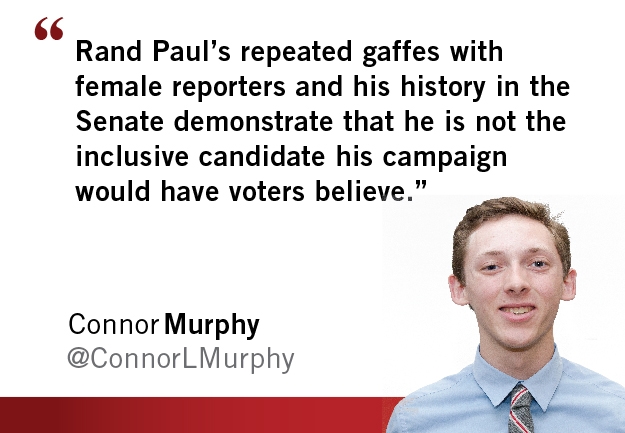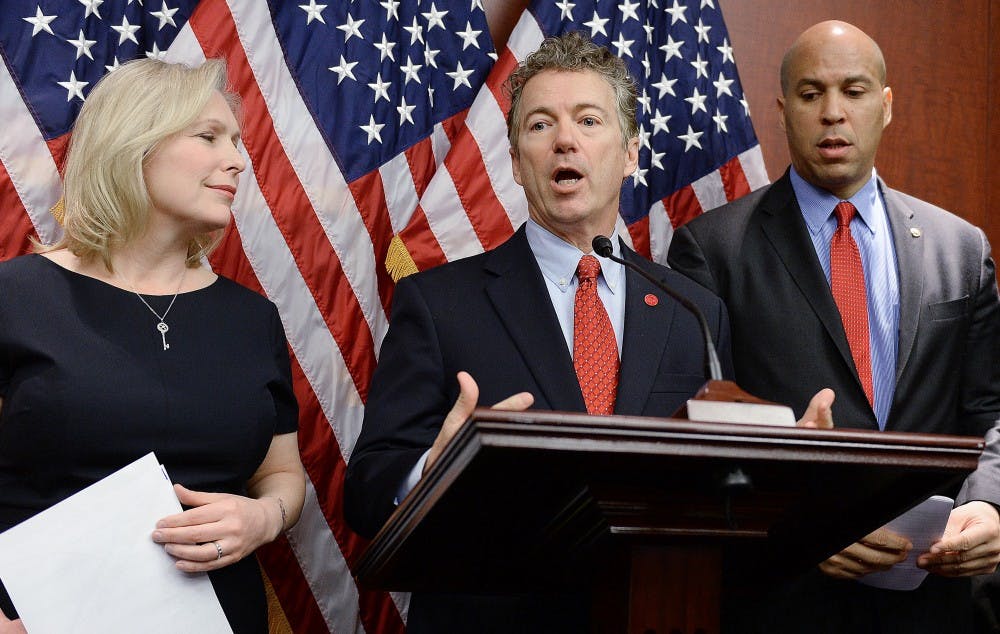On April 7, Sen. Rand Paul of Kentucky announced that he would run against Ted Cruz for the Republican nomination for the presidency. The announcement was not unexpected, as Paul has long been considered one of more than a dozen viable Republican candidates. Republican Sen. Marco Rubio has since entered the race, and Democrat Hillary Clinton has also launched her own long-anticipated campaign.
Among what will surely be a crowded Republican field, Paul stands out. Although he was initially known better as Ron Paul’s son rather than a respectable politician in his own right, Paul has quickly risen to prominence. His firm stance against domestic intelligence collection, such as that conducted by the NSA, and almost isolationist foreign policy provides an interesting alternative to more traditional Republican candidates.
Paul has also attempted to brand himself as a candidate of inclusion and diversity. Paul and Corey Booker, Democratic Senator of New Jersey, united in the Senate to decriminalize marijuana at the federal level and lessen stringent sentencing practices in the judicial system. These initiatives are not only unusual for a Republican (though it may be more appropriate to describe Paul as libertarian), but also demonstrate a successful history of bipartisanship.

Recognizing the concerns of minority voters is of vital importance today. The spat of shootings against African-American citizens by police officers, and often-disproportionate sentencing of African Americans and Hispanics for drug related offenses have revealed that our nation still struggles to even recognize systemic racism, let alone correct it. Paul’s platform, which is intended to appeal to a wide demographic, is at least a start towards addressing these concerns through a presidential election.
But Rand Paul’s campaigns fails to account for the concerns of our nation’s most significant, if not unappreciated, voters: women.
Rand Paul’s repeated gaffes with female reporters and his history in the Senate demonstrate that he is not the inclusive candidate his campaign would have voters believe, as he lacks necessary concern for women’s issues.
To preface my first point, female voters are unquestionably one of the most significant voting blocks in American politics. Although President Obama only won the popular vote by approximately 2 percentage points, he beat Mitt Romney by 12 percentage points among female voters according to Gallup (56 percent to 44 percent. The Rutgers Center for American Women and Politics reported that more than 63 percent of eligible female voters participated in the 2012 election, totaling more than 70 million women. Additionally, there are over 10 million more registered female voters than male voters. Presidential candidates must address the concerns of female voters if they hope to win the election now more than ever before.
Moreover the last presidential election cycle saw an unprecedented increase in female candidates winning election for public office. As CNN reported, 20 women held seats in the Senate following the 2012 election, including the first openly lesbian senator. Men dominated American politics for decades, if not centuries, but the American political landscape is increasingly reflective of the actual gender diversity of our nation.
Rand Paul is apparently unaware of this shift, and this ignorance will kill his presidential ambitions.
The easy column to write on Rand Paul and women’s issues regards his recent interviews with Savannah Guthrie of NBC News and Kelly Evans of CNBC. In both interviews, Paul drew widespread criticism for silencing or interrupting the two experienced female reporters. This unusual behavior is made all the more bizarre given that there are few, if any, notable instances of Paul treating a male reporter the same way.
But Paul’s inability to address the concerns of female voters goes far beyond simply conducting two bad interviews. If anything, the two interviews were more revealing of the possible shortcomings of Paul’s foreign policy and revealed a volatile temperament that is unsuited for the presidency.
The more meaningful issues to address are Paul’s policy proposals and voting history relating to female political rights. Both issues raise concern.
Paul voted against the renewal of the Violence Against Women Act, a measure intended to combat sexual violence and domestic assault at the federal level. Paul has repeatedly voted against the Paycheck Fairness Act, in spite of women still only making $0.78 on the dollar as compared to men.
Most importantly, Paul’s stance on abortion also raises concern. In a recent interview with the Associated Press, Paul once again became the subject of widespread criticism by flippantly demeaning the debate regarding abortion as a matter of "details."
The entire debate concerns the details, Rand. Regardless of whether you are Pro-Life or Pro-Choice, to oversimplify the debate on abortion discredits the significance of the issue to women on both sides of the debate. Paul’s very stance regarding abortion is even ambiguous, as some have accused the Senator of changing his stance to become more in line with mainstream conservatives for the election.
Additionally, Paul’s website makes little to know mention of women’s rights or issues, listing sanctity of life as one of the last options under the “issues” tab.
All of these actions reveal a lack of concern for what are arguably some of the most important issues facing female voters today, and show that Paul’s inclusive campaign apparently does not extend to women.
Savannah Guthrie and Kelly Evans both merited the respect that any member of the media, male or female, ought to receive. Paul deserves the criticism he has received for these interviews (interestingly, Paul has sent his wife Kelley to handle accusations of sexism that have stemmed from these interviews).
But Rand Paul’s extensive history of voting against policies that can improve the quality of life of women and lack of concern for abortion policy are what really demonstrate his disregard for women’s issues. Particularly in a year when the presumptive democratic nominee will be a woman, Rand Paul’s inability to respond to the concerns of female voters may have already doomed his fledgling campaign.
Reach the columnist at clmurph5@asu.edu or follow @ConnorLMurphy on Twitter.
Editor’s note: The opinions presented in this column are the author’s and do not imply any endorsement from The State Press or its editors.
Want to join the conversation? Send an email to opiniondesk.statepress@gmail.com. Keep letters under 300 words and be sure to include your university affiliation. Anonymity will not be granted.
Like The State Press on Facebook and follow @statepress on Twitter.




